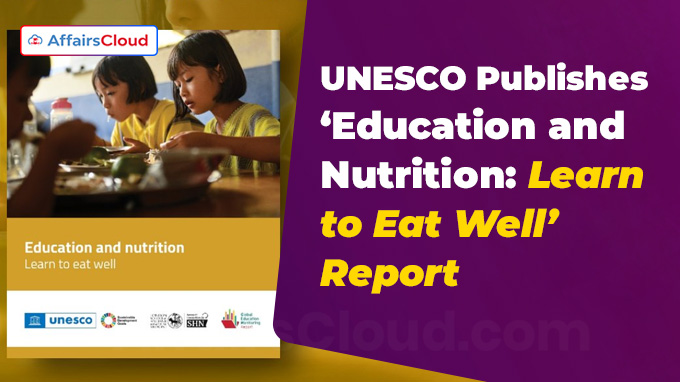 Paris (France)-based United Nations Educational, Scientific and Cultural Organisation (UNESCO) published its latest report titled ‘Education and Nutrition: Learn to Eat Well’, which focuses on the quality of meals served at schools worldwide. The report was released on the occasion of the ‘Nutrition for Growth (N4G)’ event, hosted by France from March 27 to 28, 2025 in Paris.
Paris (France)-based United Nations Educational, Scientific and Cultural Organisation (UNESCO) published its latest report titled ‘Education and Nutrition: Learn to Eat Well’, which focuses on the quality of meals served at schools worldwide. The report was released on the occasion of the ‘Nutrition for Growth (N4G)’ event, hosted by France from March 27 to 28, 2025 in Paris.
- The report was prepared by the UNESCO in partnership with the Research Consortium for School Health and Nutrition.
- The report urged governments to not only expand access to school meals but to also improve their nutritional quality.
Key Findings:
i.The report revealed that nearly 50% of primary school pupils globally received school meals in 2024. However, it cautioned that the nutritional value of these meals remained a pressing concern.
ii.The report highlighted that nearly a third (27%) of school meals across the world in 2022, were not developed in consultation with nutritionists.
iii.The report showed that only 93 countries out of the 187 that were examined had legislation, standards or guidelines on school food and drink.
- Of these 93 countries, only 65% had standards covering foods sold in cafeterias and vending machines.
iv.According to the report, nutritious school meals are linked to both improved health and academic outcomes. It showed school meals increased enrolment rates by 9% and attendance by 8% among pupils, and also improved learning.
v.The report underscored obesity among school-age children had more than doubled in most countries since 1990, while food insecurity continued to increase.
vi.418 million children now benefit from school meals worldwide, which is 30 million more than the 388 million children before the pandemic in early 2020.
- Worldwide, more than half of school feeding programs are missing adequate amounts of fruits and vegetables, while about one-third provide sugary drinks, underscoring major nutritional deficiencies in these initiatives.
Key Initiatives Improving School Meals:
The report has outlined various positive initiatives led by different countries to improve nutrition at school.
i.The national school feeding programme in Brazil, supported by UNESCO, has imposed restrictions on ultra-processed products.
ii.China has introduced vegetables, milk, and eggs in rural schools have improved nutrient intake of children, which further help to boost school attendance.
iii.In 2014, Nigeria launched the Home-Grown School Feeding Programme, which aims to provide a free, balanced meal every day in all public primary schools, has increased the primary school enrolment rate by 20%.
iv.India has introduced fortified organic pearl millet which is rich in iron, into school meals in the state of Maharashtra has improved the attention span and memory of adolescents.
- India’s Pradhan Mantri Poshan Shakti Nirman (PM POSHAN)scheme feeds 118 million children daily , one of the largest school feeding programs globally.
v.In 2025, UNESCO will develop a set of tools to help governments and education professionals to address health and nutrition issues in schools.
- These tools will include a practical guide and a training programme.
- This work will also render its support to the Coalition for School Meals (UNESCO is also part of this initiative) and is working to ensure that every child gets nutritious meals at school.
About United Nations Educational, Scientific and Cultural Organisation(UNESCO):
Director-General (DG)- Audrey Azoulay
Headquarters- Paris, France
Established- 1945




